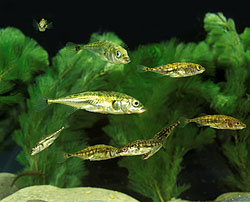(单词翻译:单击)
听力文本
This is Scientific American — 60-Second Science. I'm Karen Hopkin.
Got a minute?
When you think of a leader, you may think of an individual who is above all bold. But a new study of fish called sticklebacks shows that shy individuals actually prefer to follow fish that are similarly timid.
Researchers had trios of sticklebacks with known personalities play follow the leader. The fish were placed in a tank that had some plastic plants at one end and some food hidden at the other. In some of the groups, a bold fish and a shy fish acted as leaders, while another shy fish followed. And in other groups, it was a bold fish that did the following. The researchers recorded whether the follower sallied forth more frequently with the fish that was behaviorally similar or the one that was different.
What they found is that shy fish were more likely to emerge from under cover when an equally wary fellow was already out there. Bold follower fish did not seem to care which leader they followed.

Of course, no matter which fish a stickleback chose to stick with, the bold fish did lead more expeditions over the course of the experiment than their more retiring friends. That’s because the bold fish initiated more trips, regardless of who might be tailing them. The findings are in the journal Biology Letters.
The researchers write that "when offered a choice of leaders, sticklebacks prefer to follow individuals whose personality matches their own, but bolder individuals may, nevertheless, be able to impose their leadership, even among shy followers, simply through greater effort." We may soon see if such tendencies also hold true in humans, when Americans decide who they’ll follow in November. Unless, of course, something fishy happens.
Thanks for listening for Scientific American — 60-Second Science. I’m Karen Hopkin.
参考译文
这里是科学美国人——60秒科学。我是凯伦·霍普金。
有一分钟时间吗?
你可能认为领导者通常都是非常大胆的个体。但是一项有关刺鱼的新研究表示,害羞的鱼类更喜欢追随同样胆小的鱼。
研究人员将已知性格的三只刺鱼分为一组,观察它们追随领导者的情况。刺鱼被放在一个水箱里,水箱的一头有一些塑料植物,另一头藏有一些食物。在有些组中,一只大胆的鱼和一只害羞的鱼充当领导者,而另一只害羞的鱼则跟随它们。而在其他组中,跟随的却是一只大胆的鱼。研究人员记录了跟随者采取行动的频率,看它们是跟随行为相似的鱼出现的次数更多,还是跟随性格相反的鱼出来的次数更多。
研究人员得出的结论是,当同样谨慎的鱼出现时,害羞的鱼更可能从遮蔽物中出来。大胆的跟随者似乎并不在乎它们跟随的领导者是谁。
当然了,在实验过程中,无论一只刺鱼选择跟随哪只鱼,大胆的鱼领导的探险多于腼腆的鱼。这是因为无论是谁在跟随,大胆的鱼发起的探险更多。实验结果发表在《生物学通讯》上。
研究人员写道:“在可以选择领导者时,刺鱼更喜欢跟随在个性上同自己相符的个体,但是即使在害羞的鱼中间,较大胆的个体也能通过加倍努力来施加它们的领导力。”我们很快就会看到这种趋向性是否同样适用于人类,因为美国人将于今年11月决定他们要追随的人选。除非发生可疑的事情。
谢谢大家收听科学美国人——60秒科学。我是凯伦·霍普金。
译文为可可英语翻译,未经授权请勿转载!
重点讲解
重点讲解:
1. sally forth 勇敢投入;
例句:With these desperate speeches he sallied forth upon the desiegers.
说完这些绝望的话,他就朝围攻的人冲去。
2. be likely to do sth. 可能(做…)的;有(…)倾向的;
例句:The fires are likely to permanently deforest the land.
这些火灾很可能会彻底毁掉这片土地上的森林。
3. stick with 紧跟;紧随;和…呆在一起;
例句:Tugging the woman's arm, she pulled her to her side saying: 'You just stick with me, dear.'
她拽着那个女人的胳膊,将她拉到自己身边说:“亲爱的,你就跟我呆在一起。”
4. regardless of 不顾;不管;不论;
例句:We will do it regardless of what might happen.
不管情况怎样,我们决意这样做。
5. hold true 同样适用;
例句:This law is known to hold true for galaxies at a distance of at least several billion light years.
这个定律被普遍认为同样适用于至少数十亿光年之远的星系。


